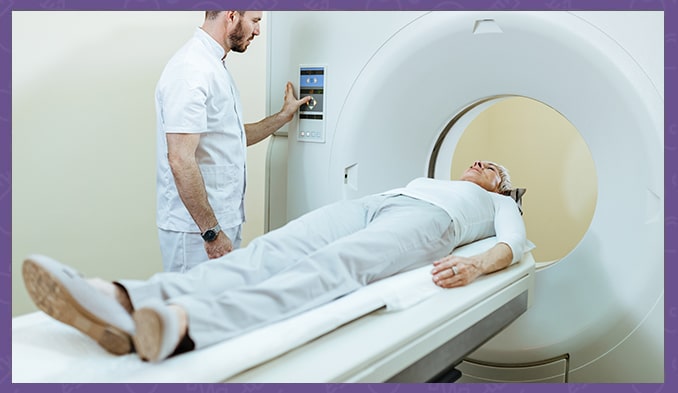Nuclear magnetic resonance (PET-MRI) is an examination that uses magnetic and radio waves to obtain detailed morphological information about tissues and organs in the body.
Positron emission tomography (PET) is an imaging test that helps measure the functionality of tissues and organs in the body.
PET-MRI is a high-end hybrid scanner that combines both examinations into one. Tracking metabolic activity in combination with anatomy, offers physicians faster detection, staging and treatment of cancer, neurological and cardiovascular diseases, while exposing the patient to lower levels of radiation.
PET-MRI- difference in cancer diagnosis
Magnetic resonance imaging is a diagnostic method with high resolution and specific imaging techniques. When performed in combination PET-MRI, a key advantage for the patient is the lower radiation exposure during the examination. The specificity of the study is increased with tumor-specific PET agents by using molecular imaging that provides metabolic, functional and numerical information for tumor diagnosis.
Why choose PET-NAMR?
- Less radiation, more information
- Reducing study time with 50%
- Better energy efficiency with one system
- Accuracy in diagnosis
- Simultaneously depicts morphology, function and metabolism
- Assessment of response from disease treatment
It can cover all types of carcinomas in one study with low radiation exposure to the patient.
What is the study?
PET-MRI is a hybrid imaging method that obtains both magnetic resonance and positron scans of the whole or parts of the body (e.g., pelvis, abdomen) simultaneously.
For positron emission tomography (PET), a small amount of radioactive substance is injected into the body. The type of substance depends on the organ or tissue to be examined. It is necessary to wait about 60 minutes for it to resorb from the body. More of the radioisotope material accumulates in cells with higher chemical activity, which usually corresponds to areas of disease.
For the magnetic resonance imaging (MRI) part, magnetic fields and radiofrequency waves change the way molecules rotate in the body. As the molecules return to their natural positions, the machine records this activity and uses the information to create detailed images of the organs being examined in the body. The images from the scan are then processed and read by a specialist radiologist.
Preparation for the study
It is necessary to notify the team if the patient has metal devices in the body - cardiac pacemaker, defibrillator, cerebral aneurysm clips or metal hearing implant. It is also necessary to remove all jewelry, metal objects from clothing, piercings, etc.
24 hours before the examination it is necessary that the patient does not take high-carbohydrate foods such as potatoes, rice, pasta, legumes. Intake of coffee, tea, juice is not recommended. It is advisable to consume low carbohydrate foods.
At least 6 hours before the examination, no food or liquids should be consumed. Additionally, it may be necessary to test the i-STAT creatinine level if the patient has established impaired renal function, diabetes, or is over 70 years of age.
During the study
After injecting the radioactive substance, it is necessary to wait in a quiet room for about an hour to rest. The patient will then be escorted to the PET-MRI room and prepared by the X-ray technician. The scan table is then moved into the unit and the examination begins. There is no opportunity for the x-ray laboratory technician to remain during the examination, but there is constant communication with him. Once the images are recorded, the table is returned to the starting position. The duration is between 45-50 minutes, depending on the area of the body being examined.








